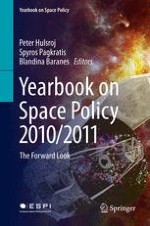2013 | OriginalPaper | Buchkapitel
11. Digital Divide and the Global Crisis
verfasst von : Julia Neumann
Erschienen in: Yearbook on Space Policy 2010/2011
Verlag: Springer Vienna
Aktivieren Sie unsere intelligente Suche, um passende Fachinhalte oder Patente zu finden.
Wählen Sie Textabschnitte aus um mit Künstlicher Intelligenz passenden Patente zu finden. powered by
Markieren Sie Textabschnitte, um KI-gestützt weitere passende Inhalte zu finden. powered by
